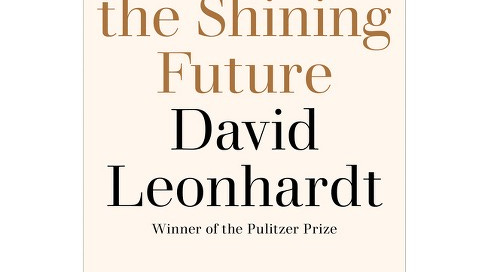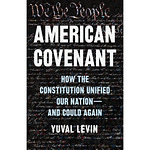Hello friends,
There is a common retort by some when they hear the now-famous phrase of "Make America Great Again." The response goes something like, 'Oh yeah, like when? When was America so great? And for whom?'
The point is that life in the past might have been good for some in America, but it wasn't necessarily for everyone. Usually, this refers to racial or sexual minorities who endured discrimination, harassment and violence in the 20th century.
And the point is well-taken. In fact, a well-known Southern Baptist leader named Richard Land was known to say, "We want to go back to the 1950's without the racism and sexism," according to Tim Alberta's book "The Kingdom, the Power and the Glory" (which was featured in last week’s note, including an interview with Tim).
Why the 50's? Well, the 50's and 60's were, in fact, an age of widely shared prosperity in the U.S. — across class and economic lines — that has never quite returned. Put another way, things were improving for all parts of society during the post-war period, and for all groups including Black Americans, despite the real presence of racial bias and discrimination against them. And things have not improved equally in recent decades. None of this is to say that things are worse now relative to the 50's for many groups, including Black Americans. Things have improved since then. But the rate of steady and ongoing improvement and progress has slowed in many ways, and stalled in some.
All this is the subject of today's episode, an interview with journalist David Leonhardt of the New York Times. You may know David from the daily newsletter for the Times that he writes, which is the Times' flagship newsletter, The Morning. David's new book is called "Ours Was the Shining Future: The Story of the American Dream." It was recently named one of the year's top 10 books by The Atlantic magazine.
"The economy has grown more slowly than it did in the postwar decades," Leonhardt writes, "producing less bounty for the population to share." And, he adds, "the economy has become more unequal, with a declining share of that bounty available to most Americans, because it is flowing to a relatively small percentage of affluent households" (xxiii).
A few pieces of data to list as evidence:
"92% of Americans who were born in 1940 grew up to earn more money than their parents" (xxii) and 80% of baby boomers (born between 1946 and 64) did so. For Generation X, (65 to 79), about 60% have made more than their parents. And then for Millenials and Generation Z, the odds have been about 50/50.
Household income, after tax pay and net worth have all grown at anemic rates, often not keeping up with inflation, especially for working-class and lower-income Americans.
It's not just economic data:
"The number of children living with only one parent or with neither has doubled since the 1970's" (xxiv).
"The obesity rate has tripled" (xxiv).
"The number of Americans who have spent time behind bars at some point has risen five-fold" (xxiv).
"Measures of childhood mental health have deteriorated" (xxiv).
Of the 20 highest-income countries in the world, the U.S. has had the lowest life expectancy for decades, since the 1980's (xvi). "Drug overdoses, alcohol-related liver disease and suicides" play a large role in this (xxiv).
For "tens of millions of Americans," the following is their reality, he writes:
"You are not much richer than your grandparents, and your grandparents were not rich. You are no healthier than your parents, and your kids are less healthy than you. You cannot tell stories of upward mobility, because they would not be true. Instead, you are frustrated about decades of hard work gone unrewarded, and you are anxious, for your future and for your children's" (xv).
You might have known some of this, or maybe much of it. But Leonhardt's book is a history of how this happened: both the boom in working-class fortunes after World War II and the huge rise in inequality since the 1970's. It is a convincing argument against an oversimplification: the idea that the U.S. economic boom and our decline in recent decades is all a product of historically anomalous factors that we have little control over.
There is a degree to which the post-war boom was a once-in-human-history event. Europe and Japan were ravaged by the war and rebuilding. The Soviet Union and China were staggering under the weight of communism. Other parts of the world were underdeveloped. The U.S. stepped onto the global stage as an unparalleled behemoth at a time when everyone else was weak.
But Leondhardt's book helps us understand what helped the U.S. to share the post-war boom more equally than it might have otherwise, and how a widely shared prosperity fell apart. Much of the story has to do with the working class, with organized labor, and with the Democratic Party.
There are connections in this book to two other books I've featured here this year, just in recent months. It's a clear companion to Where Have All the Democrats Gone? by Ruy Texeira and John Judis. But it also shares some overlap with the
book The Identity Trap. All three of these books, in their own way, are sending a loud signal to Democrats that, as Texeira writes today at , "The Democratic coalition is falling apart."Why? Well, because the Democratic party is too strident and purist in ways that alienate large numbers of voters who they need to win elections, essentially. All three of these books share that analysis and are really imploring Democrats to focus on helping working class voters economically and to cast a wider and more tolerant tent on social and cultural issues, because MATH.
But Leonhard's book also points the finger at the business class as well. Here, he talks to me about the way that business leaders in the 1940's believed that they had a role to play in helping the United States go down the road of fascism and totalitarianism.
Jon Ward: I think one of the really interesting points that your history highlights and surfaces and explains is how I think by the end of the seventies, the corporate sector, the business world in America had no longer come to see their self-interest as opposed to the national interest. And in fact, they came to see the two as one and the same. Can you just briefly talk about how that happened? I think that's really important to understand.
David Leonhardt: One of the people whose stories I tell in the book is Paul Hoffman, who was the CEO of Studebaker, the car company in the forties, and he was really conservative. He was a classic country club Republican. He came up as a car salesman and then he ascended the ranks of the Studebaker executive sweet. And he voted against Roosevelt every time he did volunteer work for the Republicans who ran against Roosevelt. Paul Hoffman said really nasty things — although he seemed to be quite a nice guy — he said really nasty things about the New Deal. So he was really conservative.
He also, during the 1940s, came to believe that the lack of economic performance for most Americans in the early decades of the 20th century — culminating obviously in the Great Depression — really put the national interest at risk. And he looked around the world and he saw the rise of fascism in Europe, and he saw the rise of communism in Europe. And he said, look, if we are going to have this model of capitalism and of democracy, we have to make sure it delivers the goods to our citizens.
And he became the central figure in this effort to persuade corporate America, first of all, that the US economy didn't have to return to Depression after the war, which many people thought at the time, as strange as it sounds today. They thought the end of wartime production and returning soldiers would lead to this horrible depression. And he also said, not only can we have a thriving economy, but we need to have a high wage, high profit economy rather than the low wage high profit economy that we had leading up to the Depression. A
And he became this sort of evangelical telling other businessmen that they really could create this sort of high wage economy. We think of it as Henry Fordism, but actually Paul Hoffman and the people around him are kind of better symbols of it than Henry Ford. And they were right about that. And some of that came from fear. Fear of fascism, fear of revolution. A lot of it came from patriotism, but whatever it came from, it really did lead these executives to pay themselves less than they could have made. They were buddies with their board members. They could have made more.
When Eisenhower becomes the first Republican president in 20 years to take office, he's very much the candidate of corporate America. He doesn't push to lower the top marginal tax rate, which was 90% of the time. But these executives really accepted a more moderate approach to the economy, and they did it out of a mix of fear, out of a mix of patriotism and out of a sense that they were part of something larger, part of their community and part of their country, and that they cared not only about their own income and about their company's profits, but about these larger things. Now, executives today would tell you all those things. I don't think they're inherently more selfish people than the old executives, but they behave in more selfish ways. They operate in a more selfish culture. And as amorphous as culture can seem, I do think it's an important change in American life.
Democrats have not caught a vision similar to Hoffman's when they think or talk about how to avoid fascism in the U.S. And Leonhardt said the business sector today is not showing the same selflessness or patriotism when it comes to threats to democracy as it did in the 40's.
Jon Ward: You mentioned that business in the thirties and forties was — out of fear of totalitarianism — moderating its behavior. Do you see any signs of that now?
David Leonhardt: I don't see much sign of it. Donald Trump does represent an authoritarian threat, and you see almost no courage from corporate America in making that clear. So I don't see much sign of it.
Interesting Reads
At 33, I knew everything. At 69, I know something much more important - By Anne Lamott for The Washington Post
My white-haired husband said on our first date seven years ago that “I don’t know” is the portal to the richness inside us.
The portals of age also lead to the profound (indeed earthshaking) understanding that people are going to do what people are going to do: They do not want my always-good ideas on how to have easier lives and possibly become slightly less annoying.
Another gift of aging is the precipitous decline in melodrama. Enjoying how unremarkable life is takes practice and time, and then the little things start to shine and delight. Life gets smaller and in its smallness it starts winking at you.
Memorial Celebrates Rosalynn Carter’s Life, a ‘Public Love Story’ by Peter Baker for The New York Times
Picasso: Creator and Destroyer by Arianna Huffington for The Atlantic
Church, Where are You? by Anne Snyder for Comment
The church is a body of people redeemed by Jesus Christ who are caught up in the life of God, not a social service organization. Still, one would think that its divine life would make it uniquely equipped to bring oxygen to the starved arteries of contemporary life: Concerned about how little we seem to understand each other across class and cognition, generation and politics? The church, in theory, should break down such walls. Concerned about artificial intelligence and a technological age spinning rapidly beyond our grasp? The church, in theory, should keep us grounded in sacred rhythms, embodied relationships, a robust moral imagination, the stuff that keeps us human and reminds us that God remains God. Concerned about the overpoliticization and undermoralization of our public life? The church, in theory, should be cultivating leaders sensitized to the lines between good and evil. Concerned about a culture that sets up irredeemable battles between friend and foe? The church, in theory, should have what it takes to model how we respond to our enemies with love.
It’s as if the church is the missing puzzle piece for precisely this moment. But she is caught flat-footed, mired in her navel, lacking vision and supernatural power.
… We’ve sought out authors who can see the symptomatic dysfunction for what it is and probe deeper into the forces underlying it: the overwhelming rush of modern time; the problem of freedom and autonomy; the difficulty of maintaining a community’s coherence in an ever more fractured, mobile, and individualistic age; the constantly shifting reductionism of language that makes us numb to God’s action in the world; the fear that keeps us from enmeshing ourselves in relationships of risk.
The Trump dictatorship: How to stop it by Robert Kagan for The Washington Post
… Some readers of my last essay asked fairly: What can an ordinary citizen do? The answer is, what they always do when they really care about something, when they regard it as a matter of life and death. They become activists. They get organized. They hold peaceful and legal rallies and marches. They sign petitions. They deluge their representatives, Republican or Democrat, with calls and mail, asking them to speak up and defend the Constitution. They call out their political leaders, state and local, and give them courage to stand up as well. Americans used to do these sorts of things. Have they forgotten how? At the risk of sounding Capra-esque, if every American who fears a Trump dictatorship acted on those fears, voiced them, convinced others, influenced their elected officials, then yes, that could make a difference.














Share this post